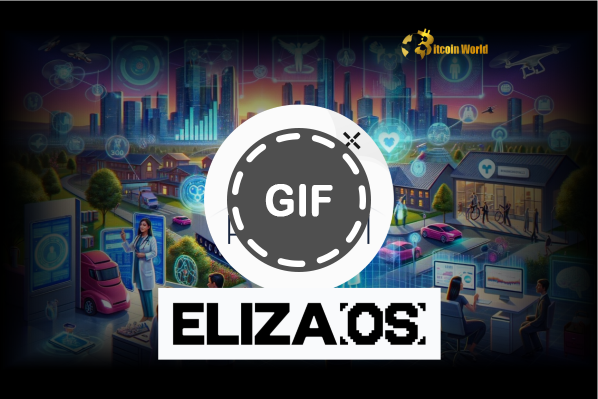BitcoinWorld

Exciting Pundi AI Partnership with elizaOS Boosts Decentralized AI Agents
Get ready for a significant step forward in the world where artificial intelligence meets blockchain technology. The realm of Decentralized AI is buzzing with news. Pundi AI, a key player in the decentralized AI ecosystem, has just announced a pivotal partnership. This collaboration aims to tackle some of the core challenges in building effective and transparent AI applications by joining forces with elizaOS.
Unpacking the Pundi AI Partnership with elizaOS
Pundi AI made the announcement via its official X account, revealing its new strategic alliance with elizaOS. For those unfamiliar, elizaOS is an open-source protocol specifically designed for creating autonomous AI Agents. This partnership is not just a handshake; it’s a technical integration designed to bring tangible benefits to developers and the broader AI landscape.
The primary goal is clear: to introduce truly decentralized data capabilities and facilitate the creation of smarter, more capable AI Agents. By leveraging the elizaOS framework, developers gain a direct pathway to integrate diverse datasets into their AI models. This integration is crucial because the quality and accessibility of data are paramount to training effective AI.
Think of it this way: traditionally, AI models often rely on centralized, sometimes siloed, datasets. This can lead to biases, lack of transparency, and limitations in what the AI can learn or do. The Pundi AI and elizaOS collaboration seeks to change this by enabling a decentralized approach to data feeding, enhancing model performance and leading to more effective training for autonomous agents.
Why is Decentralized AI and AI Agents Integration Important?
The convergence of decentralization and AI is powerful. Here’s why this partnership matters:
- Enhanced Data Integrity: Decentralized data sources can offer greater transparency and immutability, crucial for training reliable AI.
- Reduced Bias: Accessing a wider, more diverse range of decentralized datasets can help mitigate biases often found in centralized data.
- Increased Autonomy for AI Agents: By providing agents with access to verifiable, decentralized information streams, they can operate more independently and make more informed decisions.
- Empowering Developers: The partnership simplifies the process of integrating decentralized data into AI models, lowering the barrier to entry for building advanced AI applications.
The synergy between Pundi AI’s ecosystem and the elizaOS protocol framework is designed to foster an environment where developers can experiment, build, and deploy sophisticated AI Agents with confidence in their underlying data infrastructure.
How Does the elizaOS Protocol Facilitate This?
The core of this technical integration lies in the elizaOS protocol. As an open-source framework, it provides the necessary tools and structure for defining, deploying, and managing autonomous agents. The partnership specifically highlights how elizaOS allows developers to connect external data sources directly to their AI models.
Using the elizaOS framework, developers can now:
- Define the data requirements for their AI model.
- Utilize the elizaOS tools to connect to decentralized data streams or verified external data sources.
- Integrate this data seamlessly into the model’s training or operational process.
- Deploy the model as an autonomous agent capable of leveraging this decentralized data.
This direct integration capability is a significant technical advantage, streamlining a process that could otherwise be complex and fragmented. It leverages the strengths of both Pundi AI’s focus on decentralized infrastructure and elizaOS’s protocol for agent orchestration.
Building Smarter Agents: The Benefits for Developers
For developers working on the frontier of AI and blockchain, this partnership opens up exciting possibilities. The ability to build smarter AI Agents is directly tied to the quality and accessibility of the data they consume.
Key benefits for developers include:
- Access to Decentralized Data: Tap into new sources of data that are transparent and potentially more resilient to manipulation than centralized alternatives.
- Improved Model Performance: Better data leads to better training, resulting in more accurate and effective AI models.
- Faster Development Cycles: The streamlined integration process via elizaOS reduces the complexity of data pipelines.
- Innovation Opportunities: Build novel applications that were previously difficult due to data limitations or centralization concerns.
- Leveraging Blockchain AI: Directly utilize the benefits of Blockchain AI, such as verifiable computations and tokenized incentives within their agent designs.
This collaboration is poised to accelerate innovation in areas like decentralized finance (DeFi) AI agents, supply chain optimization, data analysis, and more, all powered by reliable, decentralized information.
Challenges and the Path Forward for Decentralized AI
While the partnership is promising, the path to widespread Decentralized AI adoption isn’t without its challenges. Scalability of decentralized networks, the complexity of integrating various blockchain protocols, and ensuring data quality across distributed sources are ongoing hurdles.
However, initiatives like the Pundi AI and elizaOS partnership demonstrate a clear commitment from key players to address these issues head-on. By providing developers with practical tools and frameworks, they are laying the groundwork for a more robust and decentralized AI future.
The open-source nature of the elizaOS protocol is particularly important here, encouraging community contributions and fostering rapid development and improvement.
What Does This Mean for the Future of Blockchain AI?
The convergence of blockchain and AI, often referred to as Blockchain AI, is a rapidly evolving field. This partnership signifies a maturation of the ecosystem, moving beyond theoretical concepts to practical implementations that empower builders.
By focusing on the fundamental need for decentralized data access for AI agents, Pundi AI and elizaOS are contributing to a future where AI is not only powerful but also transparent, auditable, and less reliant on centralized points of control.
This could pave the way for truly autonomous systems that operate on decentralized networks, interacting with smart contracts and decentralized data streams to perform complex tasks without human intervention.
Actionable Insights for the Community
If you are a developer, researcher, or simply interested in the future of AI and blockchain, here’s what you can do:
- Explore the elizaOS documentation and framework to understand its capabilities for building AI agents.
- Look into the Pundi AI ecosystem and how it facilitates decentralized AI applications.
- Consider how you could leverage decentralized data sources in your own AI projects using the tools provided by this partnership.
- Stay updated on announcements from Pundi AI and elizaOS for potential workshops, grants, or developer programs.
This collaboration is a call to action for the community to start building the next generation of AI applications on a decentralized foundation.
Conclusion: A New Era for AI Agents
The partnership between Pundi AI and elizaOS marks a significant milestone in the journey towards truly decentralized and intelligent autonomous agents. By focusing on the critical need for integrated, decentralized data, they are providing developers with the tools necessary to build smarter, more reliable, and transparent AI applications. This collaboration not only accelerates the development of AI Agents but also strengthens the foundation of the broader Decentralized AI ecosystem. It’s an exciting development that promises to unlock new potential at the intersection of blockchain and artificial intelligence.
To learn more about the latest Decentralized AI trends, explore our article on key developments shaping Blockchain AI institutional adoption.
This post Exciting Pundi AI Partnership with elizaOS Boosts Decentralized AI Agents first appeared on BitcoinWorld and is written by Editorial Team





